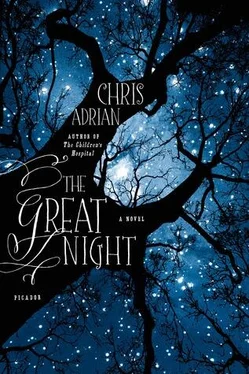André Aciman
The Great Night
And I do love thee: therefore, go with me;
I’ll give thee fairies to attend on thee,
And they shall fetch thee jewels from the deep,
And sing while thou on pressed flowers dost sleep;
And I will purge thy mortal grossness so
That thou shalt like an airy spirit go.
— William Shakespeare, A Midsummer Night’s Dream, III, i, 163–68
O ne night in the middle of June, three brokenhearted people walked into Buena Vista Park at nearly the same time, just after dark. One came from the north, out of the Haight, another climbed up out of the Castro from the east, and the last came from the west, out of the Sunset and Cole Valley: this one was already going in the wrong direction, and shortly all three of them would be lost. They were going to a seasonal party of the famously convivial Jordan Sasscock, at his home at 88 Buena Vista West (Molly was headed, mistakenly, to 88 Buena Vista East). Jordan’s parties were as famously convivial as he was, and the invitations, while prized, were not exactly exclusive, because it was in the nature of his conviviality never to leave anyone feeling left out. There were swarms of people who trudged up the hill in the middle of every summer to drink Jordan’s beer and wine and stand on his roof and dance in his expansive garden. He was a lowly resident at the hospital nearby, but his grandmother had died five years before when he was still a medical student, leaving him the house and the garden and all the treasures and garbage she had stuffed into it in the eighty-nine years she had lived there: ruined priceless furniture and money under the mattresses and case after case of fancy cat food in the basement, and fifteen cats, only five of which were still alive on the night of the party, because, affable as he was, Jordan didn’t much like cats, and he didn’t take very good care of them.
Henry, like the other two people entering the park, was late. He was not even sure he was entirely invited, though it seemed that everyone at the hospital was invited, just as he wasn’t sure that Jordan Sasscock liked him, though Jordan seemed to like everybody. They happened to be working together that month on the Pediatric Oncology service, and here and there a flail or a mistake had occurred that was almost certainly Henry’s fault, and yet somehow the blame had spilled onto Jordan. Henry generally sought out blame, being comfortable with it, having been blamed for all sorts of things his whole life long and having accepted responsibility for all sorts of crimes he had only barely committed, at ease in the habit of culpability because he had an abiding suspicion, fostered by an unusual amount of blank history in his childhood, that he had once done something unforgivably wrong.
Three months before, he would have stayed home on a night like this, in the context of an invitation like this, entertaining potential scenes of confrontation or humiliation or trickery: Jordan telling him quietly to leave, or asking from the middle of a group of encircling unfriendly faces if he could see Henry’s invitation; didn’t Henry know an invitation was necessary to come to the party? But Henry had turned over a new leaf since his lover had issued his latest and most final rejection. He was spending less time imprisoned in imaginary scenarios, and through no recognizable effort of his own he was becoming, day by day, a better man. It was a shame, really, that all the faults and neuroses and quite considerable pathologies that had helped spoil the relationship were finally lifting from him just in time to be too late. The timing was ridiculous, and it added significantly to his heartbreak that it had done no good to demonstrate his renaissance to Bobby, who had been out to San Francisco for a month to work (and expressly not, he said, to visit Henry). Bobby had issued his most detailed, hope-abolishing rejection on the day before he left, and they hadn’t talked in all the months that had passed since then. It was a dismal discovery: there were so many different intensities of rejection, and every successive “no!” could feel worse and worse. It had put Henry into a state of what felt like perpetual agony, and yet he wasn’t exactly depressed, or at least he was depressed in a totally different way than he had been all his remembered life up until then. Dull, quotidian misery had been replaced with a brighter sort of suffering, and he felt more connected to everything and everyone around him than he had for twenty years. Each day for weeks he had given up some neurotic quirk: excessive hand washing; fear of doorknobs and the ground; a reluctance to touch the sick children of smokers; fear, most recently, that having a single drink of alcohol would transform him into a monster. “People like us shouldn’t drink,” his mother had told him, over and over and over, “because of the horrible things that have happened to us.” With one hand she would mime throwing back a shot and with the other draw an imaginary knife across her throat. “Ack,” she’d say, as her invisible lifeblood poured out. “Instant addict.” Never mind all that. He had already decided to drink a lot of beer at the party.
There remained, of course, the fear of the park itself, part and parcel of his old habits of bleaching and hand-washing and hand-wringing. The place had used to make his skin crawl, and the whole city and even the state around the park had made him uneasy even before it became intolerable to imagine being there. He had lived in San Francisco as a regular child, and then as a child abducted, and those unremembered years between the ages of nine and thirteen had cast a pall over the whole city. The story, as little of it as he had reconstructed, was as weird as the behaviors he had manifested when it could not be contained any longer in unmemory, and the strangeness of it had attracted Bobby in the beginning, as much as it had ultimately tortured him and driven him away in the end.
It’s just a park, he thought, standing at the entrance, just a collection of trees and bushes artfully planted to approximate a wild wood on a hill. The worst thing about it, in fact, was that Bobby had brought him here to tell him to fuck off forever, to leave him alone for all eternity, to never bother him again , and part of Henry was still sensitive to the imagined residues of physical and emotional trauma, though he wasn’t controlled anymore by his aversion to them. He would take a break and sit on the very fucking bench where Bobby had said goodbye, just for the sake of doing it, and he would consider how atrociously sad and ridiculous the collapse of their relationship was, how all the pieces of an extraordinary partnership had come together in just the wrong way. Then he would set the timer on his phone and spend a full five minutes demonstrating to the uncaring world and his unwatching lover that he was not who he had been.
Henry stepped off Haight Street onto the first step up into the park, thinking again that his was as magical a transformation as to have woken up one day to find he had become a pony. And he had a little daydream about Henry the pony, because even though he had been liberated from the obsessive prisons of his imagination, he was still an inveterate daydreamer. He was sure it must be an escaping wisp of the daydream when he thought he saw a face in the stone wall beside the step and thought he heard a voice say, very clearly, “Poodle!” He stopped and peered at the wall; it was getting dark, so when he stared all he could see was a rough suggestion of the texture on the stone. He shook his head and did a little pony step and kept walking into the park.
Читать дальше












